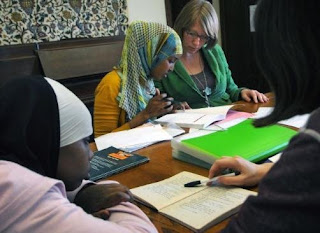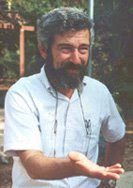
Here are two articles about Muslim integration into western society. The first is from my local newspaper, the Mpls Star Tribune, and features Augsburg, an ELCA college in Mpls. The second is a Reuters release about attitudes revealed in polling in the western democracies of Europe that suggests Muslims are less integrated in Europe than in America.
Not so long ago, Fadli Mohamed would not have fit the mold of typical Augsburg College students: She’s no white Lutheran kid from the suburbs.
But change has come rapidly to the small, 140-year-old Lutheran college that shares its Minneapolis Cedar-Riverside neighborhood with the highest concentration of Somali people in the United States.
For years Augsburg has reached out to its immigrant Muslim neighbors, helping to care for their infants, tutor their high school students and feed their elderly as part of the college’s service learning program.
Now children from those Somali families, people like Mohamed, are increasingly enrolling at Augsburg, rising from a handful three years ago to more than 30 this year. It’s still a small fraction of the 1,900 daytime undergraduates, but they’re a notable presence among those lending a hand to the neighborhood.
“It gives a different face to the college’s volunteerism and service,” said Mohamed Sallam, director of the college’s Pan-Afrikan Center. “These are students who may or may not come from this neighborhood but feel connected to it through ethnic and religious identity. They are products of the community and they’re giving back in such a way where members of the community can feel very proud.”
Students volunteer in the neighborhood, but they study there, too. A journalism class interviewed people from different backgrounds to create a cookbook called “The Taste of Cedar-Riverside.”
Mary Laurel True, associate director for the college’s Center for Service, Work and Learning, said the program is not an add-on. “The whole idea of service learning is that it’s integrated into the classroom, into everything we do.”
Augsburg undergraduates are required to take two religion courses, and in studying Islam, they hear about the faith from people who practice it, often visiting one of the four mosques within blocks of the school.
“Here we are, this Lutheran institution, and yet we have this rare gift to experience — not just read about, but experience — other people’s faith,” said Paul Pribbenow, the college’s president since 2006.
After being greeted by imams at the mosque, students take off their shoes, enter and observe people praying, said assistant Prof. Jeremy Myers. His introductory religion course is called “Christian Vocation and the Search for Meaning,” but he’s hoping to add “in Cedar-Riverside” to its title.
There, students “experience hospitality,” Myers said. “Especially in the last eight years — and even within the last few months — it’s important that they learn what Islam is and what it’s not. It’s important that people see the truth or a different side of the truth.”
Embracing the city
Augsburg College was founded as a Lutheran seminary in rural Wisconsin in 1869 and relocated three years later to Minneapolis. Early in the 20th century, the school “embraced the community and saw Minneapolis as a place of opportunity and service,” a chapter on Augsburg in a 1998 book titled “Successful Service-Learning Programs” recounts.
However, the school also has a long history of “organized efforts … to move to the suburbs for ‘more room and fresh air … more desirable locations,'” according to the text.
That tension occasionally resurfaced over time.
“If you go back even 10 years ago and look at some of Augsburg’s admissions materials, they often talked about this college as an oasis in the city,” Pribbenow said. “And I think what has shifted is that now we’re saying, we are no oasis. This is it. This is the city. We are the city.”
The makeup of the college’s incoming class has changed substantially since 2005:
Then, students of color made up 10.7 percent of the incoming class; last fall it was 17.9 percent. In 2005, the college tended to attract students from the suburbs; in 2008, the greatest number of incoming students came from Minneapolis high schools Henry and Roosevelt. The number of students who list their religion as Lutheran has dropped over that time, while the number of those who listed a religion other than Lutheran or Catholic has grown.
The appeal of Augsburg
Somali students come to Augsburg for the same reasons as any other students: Small classes, an urban setting, a focus on community service.
As a high school senior, Fadli Mohamed had her college choices ranked, with Augsburg in second place. Then she happened to meet Augsburg students who were tutoring her neighbors in English.
“They were so friendly,” said Mohamed, now 19. “Seeing people from the school doing something positive where you live — it made a huge difference.”
The number of Somali and Muslim student groups and services has grown along with the students. There’s the Pan-Afrikan center and student union — which brings together African and African-American students — as well as the newly-founded Muslim Student Association.
One of the students who helped start that group, Ahmednur Ali, was shot to death last fall on his first day volunteering at the Brian Coyle Community Center in Cedar-Riverside. The 16-year-old charged in his death reportedly shot him because Ali wouldn’t let him play basketball. Ali was the first Augsburg student to be fatally shot in the college’s history. In some ways, his passing brought the Augsburg and Somali communities closer, several students and leaders said.
People with the college talk about how Sallam and other Muslims helped fashion Ali’s memorial service so that it was reflective of Islamic traditions.
People with Somali organizations talk about how, despite some trepidation, students continued to volunteer. About how President Pribbenow was ever-present during that time.
“He came and said condolences to the father and the family,” said Saeed Fahia, executive director of the Confederation of Somali Community in Minnesota. “That’s significant. That shows the kind of neighbors they are.”
By Jenna Ross in the Mpls Star Tribune
Here is the Reuters article reprinted from MSNBC.com.
LONDON – Muslims living in European countries feel far more isolated than those living in the United States, according to a survey on coexistence, with a lack of access to education and jobs reinforcing a sense of ostracism.
At the same time, Muslims in France, Britain and Germany feel far more loyalty to their country than they are perceived to feel, and express a strong willingness to integrate.
The findings by pollsters Gallup tend to suggest that a longer period of migration to the United States and economic growth there has helped foster integration. Meanwhile, Muslims in Europe are working hard to fit in and say it is important, but they are not always seen to be succeeding.
“This research shows that many of the assumptions about Muslims and integration are wide of the mark,” said Dalia Mogahed, the executive director of the Gallup Center for Muslim Studies and co-author of a report based on the findings.
“European Muslims want to be part of the wider community and contribute even more to society.”
The survey, described as the first of its kind, polled at least 500 Muslims in June and July of last year to generate its findings on European Muslim integration. At least 1,000 members of the general public in each country were also randomly surveyed to create comparisons on specific issues.
While 38 percent of Muslims in Germany, 35 percent of those in the United Kingdom and 29 percent of those in France were found to be “isolated” in their countries, that figure stood at just 15 percent in the United States and 20 percent in Canada.
“This can be explained by the historical importance of immigration in the development of Canada and the United States as modern nations,” said Mogahed, adding that better access to higher education and work in North America had helped over decades to create more integration and social advancement.
‘Perception gap’
One of the starkest findings of the surveys was the gap in perception between European Muslims and the general public.
While nearly half of French Muslims (46 percent) said they felt integrated, only 22 percent of the French public said they felt the same about the Muslims living in their country.
In Germany, 35 percent of Muslims saw themselves as integrated, but the broader public put it at 13 percent. And in Britain, while 20 percent of the public thought Muslims were integrated, only 10 percent of Muslims thought they were.
Mogahed and co-author Mohamed Younis said the findings showed how hard it was to draw broad conclusions about Muslim integration across Europe or develop policy as a result.
They suggested that country of origin — many Muslims in France are originally from North Africa, many in Germany are originally from Turkey, and in Britain from Pakistan or Bangladesh — affected integration and/or its perception.
That certainly appears to be the case when the surveys examined the importance of certain moral issues to Muslims and compared it to the general public in each country.
In France, 78 percent of the public said homosexual acts were “morally acceptable,” while 35 percent of Muslims agreed. In Germany, the ratio was 68 percent of the public and 19 percent of Muslims. In Britain, it was 58 percent to zero. The margin of error was five percentage points in all cases.
Similar dissonance was found on issues such as viewing pornography, extramarital sex, suicide and the death penalty.
The authors suggested that a combination of more rigid views and religious practices by Muslims in certain countries had contributed to a misperception about their degree of integration, even while those Muslims were keen to integrate.
“Since 9/11 and the terrorist attacks in Madrid and London, mistrust toward European Muslims has become palpable,” the authors wrote. “Significant segments of European societies openly express doubt that Muslim fellow nationals are loyal citizens.
“The integration debate has to widen its frame, moving beyond the confines of security and religion, and focus more on the socioeconomic struggles of citizens of all faiths.”





 Rabbi Arthur Waskow is director of The Shalom Center
Rabbi Arthur Waskow is director of The Shalom Center